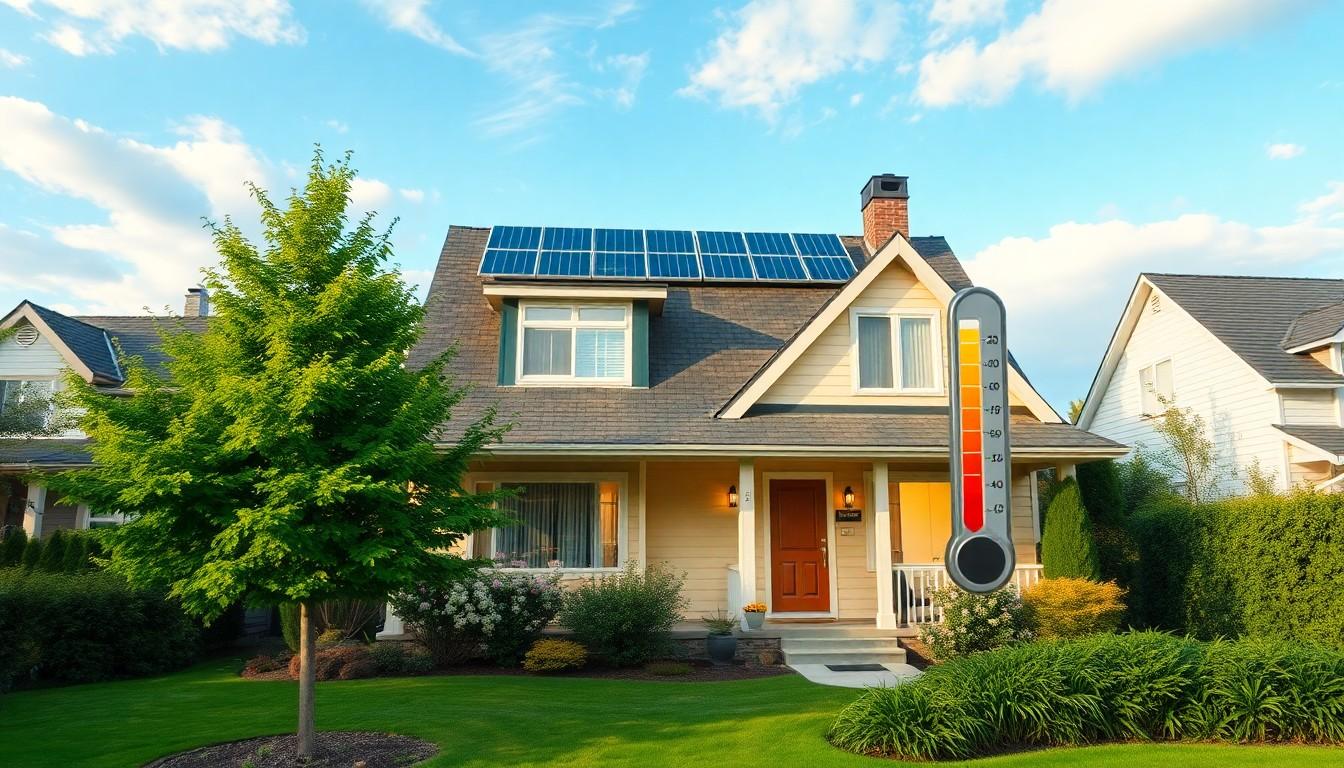In a world where plastic bags seem to multiply like rabbits and climate change feels like an unwelcome house guest, sustainable living isn’t just a trend—it’s a necessity. Imagine a life where every choice you make helps the planet breathe a little easier. The good news? Achieving sustainable living is easier than finding a cat video on the internet.
Recommendations for Achieving Sustainable Living Include
Adopting a plant-based diet reduces meat consumption, minimizing carbon footprints and conserving water. Implementing energy-efficient appliances in homes lowers electricity usage and reduces greenhouse gas emissions. Choosing public transportation or biking cuts down on personal vehicle emissions, promoting cleaner air.
Participating in local recycling programs helps divert waste from landfills, increasing material recovery rates. Purchasing products with minimal packaging lowers overall waste production and encourages manufacturers to adopt sustainable practices. Supporting local farmers’ markets strengthens community economies and promotes fresher, seasonal produce.
Engaging in water conservation techniques, like fixing leaks and using rain barrels, preserves this vital resource. Switching to renewable energy sources, such as solar or wind power, significantly decreases reliance on fossil fuels. Creating a compost system transforms organic waste into nutrient-rich soil, enhancing gardening efforts.
Prioritizing sustainable fashion reduces the demand for fast fashion, which often harms the environment. Advocating for policy changes at local and national levels promotes systemic changes necessary for broader sustainability efforts. Educating peers about the impact of individual choices fosters a culture of responsibility towards the environment.
Integrating these practices into daily life contributes to a collective effort toward achieving sustainable living. Each step taken not only benefits individuals but also the planet as a whole.
Energy Efficiency

Energy efficiency plays a crucial role in sustainable living. Reducing energy consumption lowers greenhouse gas emissions and can significantly decrease utility bills.
Importance of Reducing Energy Consumption
Reducing energy consumption benefits the environment and individual finances. A 2020 study from the International Energy Agency shows that energy efficiency improvements can reduce global energy demand by 12% by 2040. Lower energy demand eases the burden on power plants, resulting in cleaner air. Additionally, using less energy conserves natural resources and enhances energy security. Sustainable energy practices contribute to climate change mitigation, helping preserve ecosystems. Embracing an energy-efficient lifestyle forms a fundamental pillar of sustainable living, promoting long-term economic and environmental health.
Tips for Energy Efficient Home
Making a home energy efficient starts with small changes that add up. Using LED light bulbs instead of incandescent ones reduces energy usage by approximately 75%, translating to significant energy savings. Investing in smart thermostats allows for better temperature control, optimizing heating and cooling systems. Sealing windows and doors prevents air leaks, which increases comfort and reduces heating or cooling costs. Opting for energy-efficient appliances, such as washing machines and refrigerators, can lower energy consumption by 20-50%. Regular maintenance of heating and cooling systems ensures they operate efficiently. Incorporating these tips not only enhances comfort but also promotes a commitment to sustainability.
Sustainable Transportation
Sustainable transportation plays a vital role in reducing environmental impact. Emphasizing eco-friendly choices provides significant advantages for both individuals and communities.
Benefits of Public Transportation
Public transportation reduces carbon emissions and alleviates traffic congestion. Cities that promote transit systems experience improved air quality and enhanced public health. Using public transport requires fewer resource expenditures per passenger, making it an efficient alternative. Studies show that individuals who utilize public transportation reduce their carbon footprints by up to 45% compared to those relying on personal vehicles. Furthermore, the financial savings associated with lower fuel costs and maintenance expenses make public transport an appealing option. By increasing ridership in cities, communities foster greater connectivity and social equity among residents.
Options for Eco-Friendly Vehicles
Eco-friendly vehicles offer numerous choices for sustainable transportation. Electric cars significantly reduce greenhouse gas emissions, with many models now achieving long ranges on a single charge. Hybrid vehicles combine traditional engines with electric power, providing improved fuel efficiency and lower emissions. Hydrogen fuel cell vehicles represent another eco-conscious alternative, using only water vapor as a byproduct. Consumers can also consider biodiesel vehicles, which utilize renewable resources like vegetable oil. Research indicates that switching to these options can decrease individual carbon emissions by 30% annually. Available incentives for purchasing eco-friendly vehicles further encourage individuals to make sustainable choices.
Waste Reduction
Reducing waste significantly contributes to sustainable living practices. Several strategies help minimize waste in daily life.
Strategies for Minimizing Waste
Adopting reusable items is a straightforward approach. Cloth bags replace single-use plastic bags. Refillable water bottles eliminate the need for disposable plastic ones. Choosing bulk products reduces packaging waste. Planning meals prevents food spoilage and minimizes excess. Repairing rather than discarding other items extends their lifecycle. Participating in swap events promotes resource sharing within communities.
The Role of Recycling and Composting
Recycling transforms materials, preventing them from ending up in landfills. Most local programs accept paper, glass, metals, and certain plastics. Following guidelines ensures proper recycling practices. Composting organic waste returns nutrients to the soil, supporting local gardening efforts. Kitchen scraps and yard waste make excellent compost materials. National resources indicate composting can reduce waste by over 30%. Encouraging others to engage in these practices fosters a culture of sustainability.
Sustainable Food Choices
Sustainable food practices contribute significantly to achieving a greener lifestyle. Choosing local and organic options provides a direct benefit to both the environment and individual health.
Benefits of Eating Local and Organic
Eating locally grown and organic food reduces the carbon footprint associated with transportation. Supporting local farmers strengthens community economies and promotes biodiversity by encouraging diverse crop production. Organic farming practices typically avoid synthetic pesticides, which protects soil health and water quality. Health benefits also arise from consuming fresh produce that is often harvested at peak ripeness. Eating seasonally enhances flavor while giving exposure to nutrient-rich foods. Research shows that locally sourced foods can be more nutrient-dense compared to those that undergo long-distance shipping.
Tips for Reducing Food Waste
Reducing food waste plays a crucial role in sustainable living. Planning meals helps avoid purchasing excess groceries and minimizes spoilage. Utilizing leftovers creatively can transform them into new meals, extending their lifecycle. Keeping a well-stocked pantry with shelf-stable ingredients makes it easier to whip up meals without wasting perishable items. Regularly checking food expiration dates and using FIFO (first in, first out) principles for storage ensures older items get used first. Participating in local composting initiatives returns nutrients to the soil, promoting a healthy ecosystem. Engaging with community food-sharing programs encourages resource sharing while reducing waste.
Healthier Planet and a Brighter Future
Embracing sustainable living is essential for a healthier planet and a brighter future. By integrating eco-friendly practices into daily routines individuals can make a significant impact. Simple changes like choosing energy-efficient appliances or supporting local farmers not only enhance personal well-being but also contribute to community resilience.
As more people adopt these sustainable habits a collective shift occurs towards a more responsible society. This journey requires commitment and education but the rewards are profound. Together they can foster a culture of sustainability that benefits both the environment and future generations. Every small step taken today leads to a more sustainable tomorrow.

